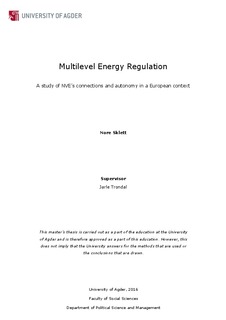| dc.description.abstract | An evolving European executive order is changing the circumstances for national steering and
administrative capacities. Increasingly compound and interconnected administrative structures
that span across levels of governance provide an environment where domestic agencies might
be serving multiple organizations or centres of authority simultaneously. Thus potentially
challenging national control and accountability.
This thesis has set out to map NVE’s potential participation in such multilevel administrative
structures for energy regulation in Europe. By examining NVE’s connection and contact with
its ministry department, the supranational organizations of the energy sector, and its
participation in transnational energy networks. Theoretically, the thesis is based on two
mutually complementing theoretical perspectives, multilevel administration and organization
theory. Whilst MLA might explain how and to what extent NVE participates in a multilevel
model of European energy regulation, certain organizational characteristics might explain
why connections occurs and what might cause inherent variations. Another goal is to consider
what consequences potential findings might entail. The methodology is based on qualitative
interviews, supplemented with document analysis.
Findings show that NVE is in active contact with especially its ministry department and its
sister regulators in the Nordic and European countries. Contact with the latter takes place
mainly through the transnational networks NordREG and CEER. Direct contact with the
supranational organizations appears limited, mainly due to organizational circumstances.
Some indirect contact might however be present, then through the transnational networks or
the EU energy agency. Thus, the thesis adds to the existing literature that there to varying
degrees exists close and direct links between Norwegian domestic agencies and the other
organizations, often through sector-specific, transnational networks. Rather than being subject
to compound steering from organizations across multiple levels of governance, it however
seems as NVE actively works in connection with multiple actors for the purpose of
harmonizing and streamlining the European power and energy market. Thus not necessarily
serving several centres of authority at exceeding levels of governance, but rather being an
active component in a compound, multilevel administrative model. Ultimately, when working
on European energy regulation, NVE appears as a specialized, professional and relatively
autonomous agency. | nb_NO |
